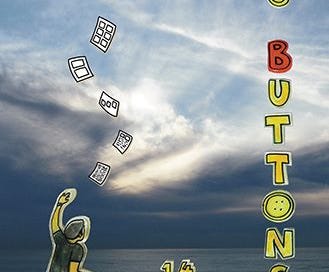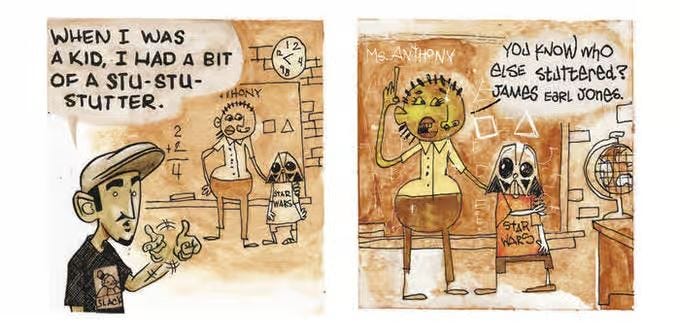So Buttons #14: Business as usual until real life comes crashing in
The latest issue of Jonathan Baylis' autobiographical comic takes a sudden emotional turn.
So Buttons #14
Written by Jonathan Baylis
Art by MariNaomi, Brian “Box” Brown, T.J. Kirsch, Sophia Glock, CM Campbell, Nathaniel Breen, Summer Pierre, Stephen Arnold, Karl Christian Krumpholz, Lisa Rosalie Eisenberg, and Ayoko Nito
Published by Alchemy Comix
Support the Kickstarter campaign
A couple months ago, I looked at some of the most recent issues of So Buttons, Jonathan Baylis’ long-running self-published autobiographical comic book series. Those issues offered a nice snapshot of Baylis’ life over the past few years, and the latest installment seems to provide more of the same, at least at first. The series has always been a bunch of short vignettes, moments from Baylis’ life that he finds interesting enough to share, even if they’re rarely of world-shaking import. And while this issue seems like it will fit into that formula, it takes a turn when a series of events hit Baylis especially hard.
The first several pieces fall into the category of what Baylis refers to as “Starfucker” in his concluding text piece, chronicling his interactions with celebrities (or at least, people who are well-known in certain communities). Brian “Box” Brown illustrates a story about a brief interaction that Baylis had with Howard Stern’s producer Gary Dell’Abate (also known as Baba Booey) that’s a good example of the type of celebrity meeting story I enjoy, where it’s so innocuous that it wouldn’t even be notable if it had been with a “regular” person.
The next two celebrity stories serve as sort of mirror images of each other. First, longtime So Buttons artist T.J. Kirsch illustrates a story about a meeting with cartoonist Chester Brown (Baylis takes some time to note his jealousy about his wife, the comedian Ophira Eisenberg, getting to meet Brown first when she hosted a panel discussion at a book festival), where Brown was gracious and kind. On the other side of the coin, Baylis provides what he acknowledges is a kind of petty ambivalence about the almost universally beloved Love and Rockets, which is due to a negative interaction with cartoonist Jaime Hernandez. This piece is fun due to the presence of artist Sophia Glock, who interjects throughout the story to tell Baylis he’s wrong about Love and Rockets.
The next piece is where the issue starts to take a turn, since it’s about James Earl Jones. He died in September of 2024, after the story was created but before the issue was published, which gives it some additional resonance. The story is mostly about the speech Jones provided at Baylis’ graduation from NYU film school, but Baylis also notes that, like Jones, he suffered from a stutter when he was younger. It’s illustrated by CM Campbell in an interesting style that combines realistic portraits of Jones with cartoony depictions of Baylis and other characters, as well as a painted texture and some of the dialogue presented like something out of a movie script. It’s lovely.
Following a cute one-pager about parenting illustrated by Summer Pierre, the issue takes the turn I’ve been mentioning, with a story about Baylis responding to the death of his comic book dealer. This gives Baylis the chance to talk about his longstanding relationship with the guy who he bought comics from all his life, who seems to be one of those quintessential New York City figures who operated a business out of some nondescript back alley and had a warm heart under a gruff exterior. The piece is illustrated in an expressive, cartoony style by Steven Arnold, and it gives Baylis the chance to ruminate on life and death.
Those ideas become even more prominent in the next piece, illustrated by Karl Christian Krumpholz, which is only two pages long, but hits like a sledgehammer, since it involves the sudden (but not necessarily unexpected) death of Baylis’ mother. It’s structured in an interesting way, first detailing an incident that seemed to rhyme with the sad loss of life and then including a series of panels from previous stories about Baylis’ relationship with his mom. It’s a bit of a gut punch, but also a celebration of how much Baylis loved his mother and how he’ll remember her.
This story is followed by reruns of the pieces in question (illustrated by T.J. Kirsch and Lisa Rosalie Eisenberg), giving an all-too-brief overview of the role that Baylis’ mother played in his life. They provide a glimpse of the love that he had for her and the memories that he’ll be carrying, and they make for a woefully incomplete tribute to one of the most important figures in his life. Finally, Ayoko Nito illustrates a one-page story in an expressive, scratchy style that ties everything together, with Baylis’ mother providing an origin for the name of the series itself.
As I’ve mentioned previously, it’s always good to check in on Baylis and see what is happening in his life. This installment of his series is a nice, relatable example of how people may be living their lives as usual before events suddenly upend everything. I found the looks at life and death and the celebration of the positive influence Baylis’ mother has had in his life to be especially affecting, a great example of what makes this series work so well. If you’re interested in these kinds of personal stories illustrated in unique styles by a variety of interesting artists, I encourage you to back the publication of this issue on Kickstarter. It’s worth the investment!








Thanks so much, Matthew! I really appreciate it!